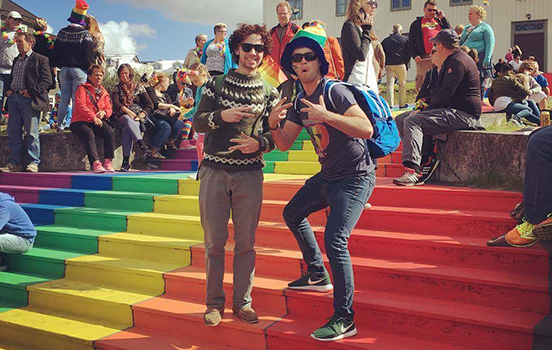 When considering education abroad, it’s important to think about the cultural and local attitudes towards sexual orientation and gender identity in your host country. Familiarize yourself with local laws and customs so you can make informed and safe choices to ensure your destination and program will best fit your needs.
When considering education abroad, it’s important to think about the cultural and local attitudes towards sexual orientation and gender identity in your host country. Familiarize yourself with local laws and customs so you can make informed and safe choices to ensure your destination and program will best fit your needs.
Get to know your destination
Explore LGBTQIA2S+ travel guides and internet resources. Talk with other LGBTQIA2S+ and allied people about their experiences in certain countries or regions to gather as much information as possible to make an informed decision about your education abroad destination. Find out what local newspapers, e-magazines or online resources may be available. Also think about how you can support fellow LGBTQIA2S+ peers while abroad. Some questions to ask include:
Learn the laws of your host country regarding sexual and gender identity
You are required to follow the laws in your host country. Once outside the United States you are no longer protected by U.S. laws. If same-sex acts are illegal in your host country and you are caught engaging in them (or presumed to have engaged in them), you could be arrested and imprisoned in that country. In some countries, the penalties are very severe and can even include deportation, corporal punishments, and worse.
Be familiar with local laws and customs so you can make informed and safe choices about destinations and programs which will be the best fit for you and your needs. Some questions to ask include:
Context, customs, and attitudes toward relationships in your host country
Similar expressions or behaviors may have vastly different meanings in different places. In some locations when you are outside distinct gay 'neighborhoods' or specific vacation or resort facilities, open expressions of your sexual orientation might be frowned upon.
In some other areas of the world, expressions of friendship (such as eye contact, a smile, touching, and physical proximity) may be quite different than those expressed among your U.S. peers and cause you to experience confusion or uncertainty about who may or may not be LGBTQIA2S+. For example, in several Middle Eastern countries hand-holding among males is a custom of special friendship and respect and does not necessarily imply homosexuality. Some questions to ask include:
Be aware of changes coming back from abroad
A journey abroad is a time of personal growth and discovery. Many transformations in personal development and self-awareness can occur, prompted by the fact that the restrictions of the home culture have been removed. Returning home is therefore a time of transition that can be difficult at times.
Be aware before you come back home of the ways in which you may have changed both independent of and as a result of your coming out.
Consider the implications of coming out when back home. Often family and friends may want to dismiss your sexual orientation as temporary due to the experience abroad, rather than acknowledge a lifelong identity.
As difficult as it is to adapt to an entirely new culture, it can be just as challenging to come back home after being away for any period of time. It is best to know what you might encounter in order to prepare for this adjustment period.
MSU Resources
Other Resources